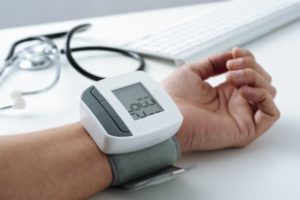 I was shocked by the results of a recent survey conducted by the American Heart Association and the American Medical Association. There’s a good chance you might be too.
I was shocked by the results of a recent survey conducted by the American Heart Association and the American Medical Association. There’s a good chance you might be too.
Perhaps you’ve heard of the “silent killer.” High blood pressure, or hypertension, can sneak up on a person without any noticeable symptoms and before you know it, heart attack, stroke, or some other major health problem appears. Over 100-million people in the U.S. are diagnosed with hypertension, yet very little of them pay attention to it or even know how to identify it.
Advertisement
The American Heart Association recommends that hypertensive people check blood pressure daily. The survey found 80 percent of people with high blood pressure do not check it that frequently. It also found that 18 percent of people don’t remember if they were diagnosed with hypertension. Perhaps most surprisingly, 64 percent of respondents indicated they were unaware of what numbers even constituted high blood pressure.
High blood pressure increases slowly and doesn’t come along with any symptoms. You won’t feel it creeping up. Because of this, people don’t seem to monitor it. Even people with hypertension who are considered “high risk” said they were not worried about being at risk for a heart attack!
What’s considered a “healthy” or “normal” blood pressure is 120 millimeters of mercury (mmHg) of systolic pressure—pressure force when the heart contracts and pushes out blood—and 80 mmHg of diastolic pressure—the pressure when your heart relaxes between beats. It reads like this: 120/80 mmHg. High blood pressure is anything above 130/80 mmHg. A high-risk reading is 140/90 and requires medical supervision.
There are at-home blood pressure monitors available online or at your local pharmacy and are easy to operate. Simply follow the instructions on the machine.
Advertisement
Taking daily readings is one of the most important things you can do if you have high blood pressure. Knowing the situation can help to alert you to any potential heart attack symptoms you might feel, like a racing heart, lightheadedness, chest or back pain, or fatigue. It can also act as motivation to make dietary and lifestyle changes that can reduce blood pressure, such as eating a more healthful and balanced diet or getting more exercise. Losing as little as 10 pounds can make a significant impact on blood pressure.
Keeping a close eye on blood pressure could be the difference between life and death. Arm yourself with the knowledge of where you stand so you can make the right decisions to protect your heart.
Also read:
- Understanding blood pressure readings key to overall well-being
- How to lower blood pressure naturally
- Essential oils for high blood pressure and how to use them
